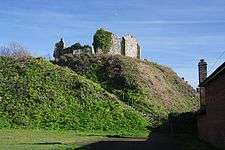Harvey I of Léon
Harvey I or Hervey I (Breton: Hoarvei, French: Hervé, or Latin: Herveus; died 1168) was a Viscount of Léon from 1103 until his death and Earl of Wiltshire in 1139–41. Harvey expanded his power and began styling himself "Count of Léon" (comes Leoniæ), but he struggled to maintain his de facto independence from his immediate overlord, the Duke of Brittany, and from the influence of the Kingdom of England across the Channel. In English he is often referred to as Hervey le Breton.

Early in his reign he declined an invitation from Henry I of England to attend his court.[1] Later, however, he went to England to assist King Stephen in the Civil War, but he was careful to state that he was going of his own free will and not out of compulsion. In reward to his service for Stephen, who was at the time secure on his throne, Harvey received the Earldom of Wiltshire and Honour of Eye as well as the hand in marriage of Sybilla, an illegitimate daughter of Stephen, all around 1139.[1] He maintained an interest in English affairs for a while afterwards, attempting to raise the priory of Eye to an abbey independent of the Norman abbey of Bernay, but to no avail.
In 1141, Stephen's foes, the Empress Matilda and her partisans, gained the upper hand and Harvey was defeated in battle. He was forced to forfeit his English lands and return to Brittany, almost certainly taking his Blesevin wife with him.[2] Harvey, probably in part because of his wife, nursed animosity towards the Plantagenet dynasty which succeeded Stephen on the throne.
As an old man in 1167 Harvey raised the standard of revolt with Eudo, viscount of Porhoët, the viscount of Thouars, and tacit support from Louis VII of France.[3] After treating with Louis, Henry II of England led a campaign against Léon in August 1167; Harvey's son Guihomar was defeated and captured, and his major castles razed. Guihomar submitted and offered hostages.[3] Harvey died soon after, in 1168.
Notes
Sources
- Everard, J. A. Brittany and the Angevins: Province and Empire, 1158–1203. Cambridge: Cambridge University Press, 2000. ISBN 0-521-66071-8.